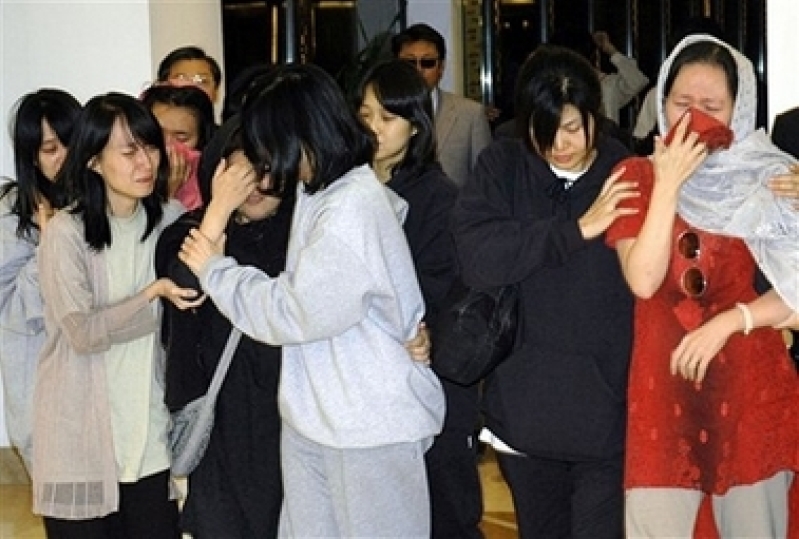
The 19 Korean Christian hostages who had been separated and moved around by their Taliban captors in Afghanistan after their abduction six weeks ago were finally reunited Friday following their release this week and began making their trip back to South Korea.
Mixed tears of pain and joy were shed by the aid volunteers early Friday as they greeted one other and heard for the first time that two of their colleagues had been killed.
“They wept. They hugged. They were shocked at the news of the two men who were killed. They didn’t know about that,” a South Korean diplomat, who requested to remain anonymous, told Agence France-Presse.
Pastor Bae Hyung-kyu, the leader of the group, was found dead on July 25, and the body of 29-year-old Shim Sung-min was found July 30. Both were killed by Taliban militants trying to pressure the Afghan government to release their imprisoned fighters.
A South Korean embassy officials said there was a 50-50 chance the Korean Christians would fly home Friday, according to AFP. The group of released hostages was later seen leaving their hotel for the airport in Kabul.
Also on Friday, the former hostages recounted their story in an interview with a South Korean media from their hotel. All foreign media were prohibited from entering the hotel.
“While kidnapped, all I could think about was staying alive,” 29-year-old Suh Myung-hwa said in an interview shown on South Korean television, according to The Associated Press. “I didn’t feel any pain under captivity, I guess because I was in a panic the whole time, but now that the tension is gone my body aches all over,” she said.
Meanwhile, 55-year-old Yoo Kyung-sik apologized for causing worldwide concern.
“I can’t sleep due to concerns that we caused so much trouble,” Yoo said in the interview. “I feel very sorry.”
The 19 Christian volunteers were freed over the course of two days after face-to-face negotiations between South Korea and Taliban representatives. The two parties struck a deal Tuesday which called for the withdrawal of 210 Korean troops – mostly medics and engineers – from Afghanistan by the end of the year and for the Korean government to ban all missionary groups from entering the country.
South Korea planned to pull out its troops by year’s end even before the hostage crisis, leaving many questioning if a secret ransom deal took place – a claim both South Korea and the Taliban have denied.
However, a well-respected Japanese newspaper, Asahi Shimbun, reported Friday that $2 million was paid to the Taliban to secure the release of the hostages.
Aside from the alleged ransom deal, the Korean government is also under fire for its handling of the hostage crisis. The international community – including Afghanistan, Germany, and Canada – has publicly criticized South Korea for giving legitimacy to the Taliban by negotiating with them and appearing to give into their demands.
The United States, meanwhile, has held back from directly criticizing Korea, saying instead it is glad to hear news of the release of the hostages and repeating its policy of no concession to terrorists.
The original group of 23 Koreans was abducted July 19 in insurgency-prone Ghazni province while on their way to provide free medical care to poor Afghans. Two female aid workers – 37-year-old Kim Kyung-ja and 32-year-old Kim Ji-na – were released earlier in August after the first face-to–face talks between South Korea and the Taliban.
The spokesman for relatives of the Korean Christians, Cha Sung-min, said the 19 will be taken to the hospital and away from the public and media while they recover, according to AFP.






